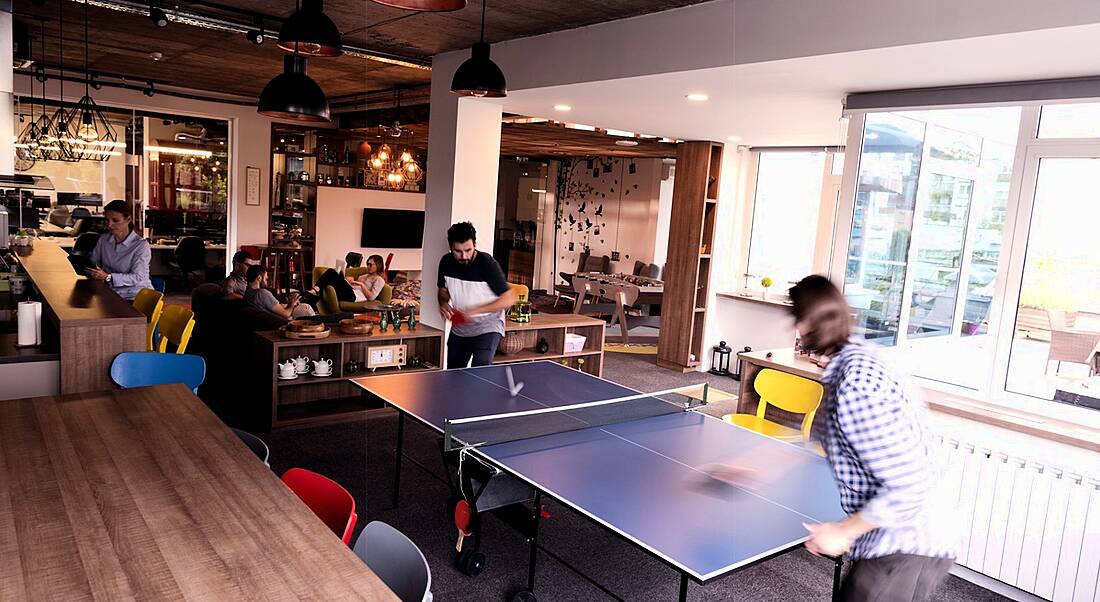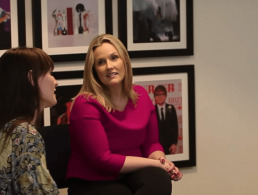Tech is synonymous with workplace perks, from on-site restaurants and lifestyle benefits to unlimited holidays. Here, Hays’ Carolyn Dickason looks at how those perks are starting to move into a more traditional sector: financial services.
A massage between meetings, a table-tennis break in the atrium before the three-day weekend … The war for talent is raging, with tech companies competing to offer staff the most extravagant workplace perks.
Now, this new work culture is spreading to financial services firms, which are focusing more than ever on their employees’ welfare and personal development. Just plain altruism? No. It’s all to attract – and retain – the best talent.
Working anytime, anywhere
Working remotely from home, from a co-working space downtown or from a café next door, is becoming increasingly common for financial services’ employees, thanks to mobile technology.
“Gone are the days when employees wielded a simple set of tools to get work done. In today’s world of anytime, anywhere work, employees use whatever device is most convenient: desktop at home, laptop at work, tablet in a client meeting or smartphone everywhere,” said Forrester Research’s 2013 Mobile Workforce Adoption Trends report.
This is not just about being more flexible. Recent research from Stanford University found that remote working led to a performance increase, fewer sick days and an improvement in overall job satisfaction. At GE Capital, the financial services branch of American conglomerate General Electric, flexible working – along with an open and inclusive culture – is one of the reasons the company took the top spot among all other financial services groups in the FT/Glassdoor ranking.
Amazing office perks
“I believe that we are currently witnessing a cultural shift in the workplace. Technology has enabled us to work from anywhere. This has blurred the lines between home and office. Instead of our offices being a place we have to go, they are becoming a place we want to go,” said Paul Boag, a digital user-experience consultant, author and speaker.
“More progressive companies are recognising this shift. They are introducing more flexible working arrangements and creating more compelling work places.”
Indeed, working at the world’s largest tech companies does not feel like work. The dress code is relaxed, the food and drinks are free and recreation opportunities abound, from pool tables to games consoles to yoga.
‘Financial services are now adopting the methods of tech and creative companies’
It will take a while until bank employees bring their dogs to the office, like AirBnB employees, or staff get up to $20,000 worth of family-planning benefits, like those at Facebook. It may take even longer for insurance employees to get to travel between floors with a slide, Google-style.
However, Paul Bennett, associate director for London occupiers at global real estate services provider Savills, told me he has seen things change a lot since the credit crisis hit. There is a movement away from the more corporate way of working, ie, suspended ceilings, raised floors and blue carpets. “A lot more design is now going into offices.”
In a context of a ‘war for talent’, financial services are now adopting the methods of tech and creative companies, and providing better working conditions. At investment firm Citadel – ranked 10th in the Best Workplaces in Financial Services 2015 survey by Great Place to Work – perks include free breakfast, lunch and dinner; beverages and snacks throughout the day; on-site fitness centres; concierge services; and ‘Citadel After Hours’ social events.
Death of the cubicle
Financial services companies are also getting out of cubicles to make more space for collaboration and innovation. As Apple’s founder, Steve Jobs, famously said, “Ideas don’t happen in the boardroom, they happen in corridors”.
Bennett has seen a big movement in the city towards loft-style space, with exposed ceilings and flexible, open-plan co-working environments, which provide more opportunities to interact. There are also more informal meeting areas and cafeterias to reflect the café culture of the millennials.
‘Ideas don’t happen in the boardroom, they happen in corridors’
– STEVE JOBS
This is exactly what they do at the Sydney HQ of Australian bank Macquarie: the building has a kitchen on every floor, encouraging employees to walk some distance to get there. The company calls it ‘functional inconvenience’ – a calculated move to make staff connect more on their way to grab a latté.
To win the war for talent, new weapons have to be used. Competition for quality staff is high, forcing employers to look for novel ways to attract employees beyond just salary.
Bennett sums it up: “How do you attract bright staff? You pay them well, but you also create a creative and stimulating environment. So you need a building with great facilities – gyms, showers, big communal facilities where people can have meetings, cafes, bars … spaces that give back to staff.”
Carolyn Dickason is director of Hays’ finance technology division in the UK. Dickason has worked with Hays since 2002, when she started as a trainee recruitment consultant. She prides herself on delivering agile and cutting-edge solutions to meet clients’ ever-changing requirements.
A version of this article originally appeared on Hays’ Viewpoint blog.




